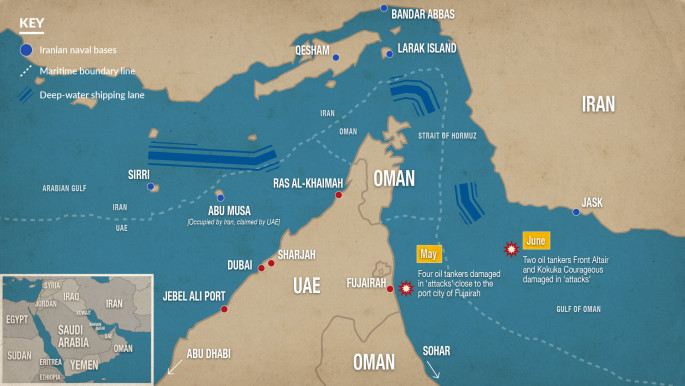Oil tankers damaged by attacks in Gulf waters arrive off UAE coast
The damaged Japanese tanker Kokuka Courageous, which was carrying highly flammable methanol through the Gulf of Oman, arrived Sunday at a UAE anchorage site.
The ship's position was some 20 miles off the coast of the Emirati port city of Khorfakkan on Sunday.
The Front Altair caught fire after the attack Thursday, sending a thick cloud of black smoke visible even by satellite from space.
On Saturday, Associated Press journalists saw the crew members of Front Altair after their Iran Air flight from Bandar Abbas, Iran, landed at Dubai International Airport.
The US has blamed Iran for what it described as an attack with limpet mines on the two tankers. Tehran rejects the allegation, instead accusing the US under President Donald Trump of pursuing an "Iranophobic" campaign against it.
Meanwhile Saudi Arabia's Crown Prince Mohammed bin Salman says the kingdom isn't seeking war in the region, but won't hesitate to deal with any threats to its people and vital interests.
In his first public remarks since attacks last month on oil tankers off the coast of the United Arab Emirates, the powerful Saudi prince accused Iran of using militias to destabilize the region.
 |
| Click to enlarge |
The prince also accused "Iran and its proxies" over May 12 attacks on four tankers anchored in the Gulf of Oman off the United Arab Emirates port of Fujairah.
Thursday's attack on two tankers - the Japanese-owned Kokuka Courageous that was carrying highly flammable methanol when it was rocked by explosions and the Norwegian-operated Front Altair - came around the time Japanese Prime Minister Shinzo Abe was meeting with Iranian leaders in Tehran.
US President Donald Trump has said the twin attacks had Iran "written all over it", rejecting Tehran's vehement denial.
The US military on Friday released grainy footage it said showed an Iranian patrol boat removing an "unexploded limpet mine" from one of the tankers.
The UAE's Foreign Minister Sheikh Abdullah bin Zayed Al Nahyan on Saturday called on world powers "to secure international navigation and access to energy", a plea echoed by regional ally Saudi Arabia after the incident sent crude prices soaring.
The UAE's Sheikh Abdullah, whose country is bitterly opposed to Iranian influence in the region, called for a deescalation of tensions.
"We remain hopeful in attaining a broader framework for cooperation with Iran," he said at a summit in Bulgaria.
'Allegations against Iran'
Iranian Foreign Minister Mohammad Javad Zarif tweeted that the US had "immediately jumped to make allegations against Iran without a shred of factual or circumstantial evidence."
British Foreign Secretary Jeremy Hunt said Friday London had concluded Iran was "almost certainly"responsible for Thursday's tanker attacks, echoing Trump’s comments.
Meanwhile, UN Secretary-General Antonio Guterres called for an independent investigation amid escalating tensions.
"It's very important to know the truth (and) that responsibilities are clarified," he told reporters at UN headquarters in New York.
"Obviously that can only be done if there is an independent entity that verifies those facts."
Follow us on Twitter: @The_NewArab





 Follow the Middle East's top stories in English at The New Arab on Google News
Follow the Middle East's top stories in English at The New Arab on Google News
![Israeli forces ordered bombed Gaza's Jabalia, ordering residents to leave [Getty]](/sites/default/files/styles/image_330x185/public/2176418030.jpeg?h=a5f2f23a&itok=_YGZaP1z)

